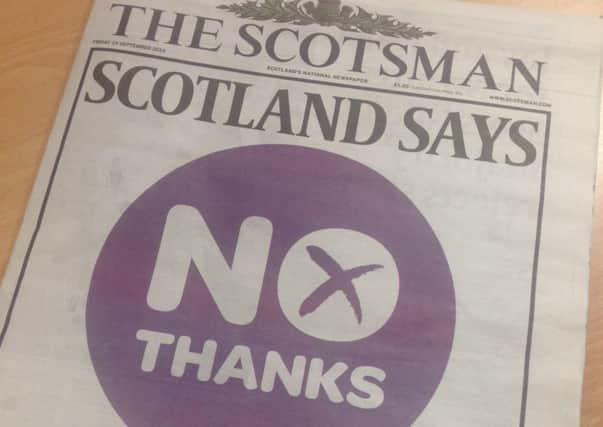John McLellan: Newspapers balanced in referendum


In the end, it was remarkable how many newspapers – including this one – did not come out for one side or another, although avowedly right-of-centre papers like the Mail, Express and Telegraph never made any secret of their opposition to independence. As a result, very few independence supporters read them and, while there is no research to prove this, I suspect few wavering voters were reading them either.
But much of the more extreme anger was aimed at the indigenous press whenever stories ran which weren’t entirely supportive of the SNP or the independence campaign, or were deemed not to be critical enough of information coming out of Better Together or Westminster.
Advertisement
Hide AdAdvertisement
Hide AdSo the results of a study into newspaper bias in the last year of the campaign by Scottish academic David Patrick will prove very important in attitudes towards Scottish publications.
He has just revealed the results of the first six months of the test, in which he studied coverage in eight dailies up till April. And while his conclusion that the Mail, Express and Telegraph heavily favoured No will come as little surprise, the rest of his findings might raise eyebrows amongst Yessers.
Dr Patrick, who supported Yes, found that for editorials, The Scotsman was the most balanced, with eight pro-Union, six pro-independence and 39 showing no bias.
For comment and analysis articles, he discovered that the Daily Record (33-19) and The Herald (65 to 46) produced more pro-independence than pro-Union pieces.
The research will do little to convince those people who believe the vote was rigged and the whole thing has been a monstrous Westminster conspiracy, but the level-headed majority must at least accept that the big Scottish dailies did not set out to deliberately skew the issues and a proper analysis of their content showed that attempts to be even-handed were more than just token.
As director of the Scottish Newspaper Society, I would be expected to defend the press’s corner but my overall impression is that the indigenous Scottish press acquitted itself very well and made every effort to ensure as wide a range of views as possible were made available throughout. Now there is objective academic evidence which appears to back that up.
There will be no shortage of views to the contrary; in particular, I wouldn’t expect the highly successful pro-independence blog Wings Over Scotland to agree, so Dr Patrick’s analysis of the second six months will be eagerly awaited.